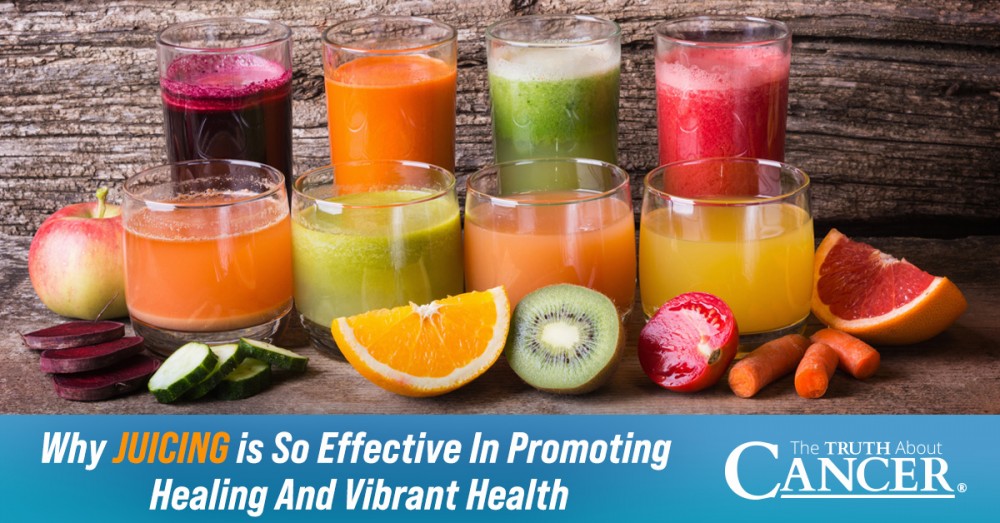When you juice fruits and veggies, they are broken down into an easily absorbed form that your body can use quickly. That means, it doesn’t have to work as hard to get the nutrients from juice as it does from solid food. All those antioxidants, vitamins, minerals, enzymes, phytonutrients, and biophotons can go to work right away in your system to renew and heal your body right down at the cellular level. Because it is broken down so well, juice is like a pre-digested food, it spares your organs of digestion a great deal of work. And guess what that means? It frees up your system to focus on healing and repair. It also equates to more energy. And, the antioxidants help your body detoxify.
To turn your health around, it’s important to flood your system with large amounts of fresh vegetable juice. It is recommended that you drink between 2 quarts and a gallon of fresh juice a day. This will feed your body with optimum nutrients and help you detox. This addresses two primary areas that contribute to cancer—nutrient deficiencies and toxicity.
We asked Dr. Cherie Calbom (aka “The Juice Lady”) about the best ways to get healthy and stay healthy through juicing. Here are her expert responses:
Q: What about removing the fiber from the juice? Is this a good thing?
A: We need fiber in our diet. But we don’t need fiber in every mouthful of food or drink. We consume fresh veggie juice as a great supplement to our diet, as a juice fast cleanse or in large quantities as a therapeutic approach to healing. But for all the media complaining about no fiber in juice, it’s interesting to note that no one ever complains that there’s no fiber in wine.
Q: What else can I do with the extra fiber I always have after juicing?
A: You can save that fiber and add it to soups and stews. My liver-gallbladder 7-day cleanse calls for a beet salad and carrot salad that you eat each day of the cleanse and you can use the beet pulp and carrot pulp to make the salads. I have an Italian Buckwheat Dehydrated Cracker recipe that uses carrot pulp as one of the ingredients. It makes a fabulous crust for my raw food pizza, which is very popular at our juice and raw foods retreats. The pulp is also great for composting and a wonderful supplement to the soil for growing wheatgrass.
Q: Doesn’t juicing have a lot of sugar?
A: Vegetable juice has very little sugar with the exception of carrot and beet juice. They are your higher sugar vegetables. I recommend you use smaller amounts of carrots and beets and dilute them with lots of green juice. Green vegetables, ginger, fresh turmeric root, garlic, lemon and lime have virtually no sugar. You can flavor veggie juice with lemon, lime, ginger, and even garlic and have virtually no sugar. This is a great addition to a ketogenic diet. You can sweeten veggie juice with a little green apple or berries for a low sugar recipe. The lowest sugar fruits are berries and green apples. Even diabetics can juice greens, which is very helpful for that condition, especially green bean juice. But many people in the health professions have no idea that greens can be juiced. How many doctors would recommend fresh fennel juice or celery juice? Health professionals are talking about fruit juice when they say that juice has too much sugar. I do not recommend that anyone drink straight fruit juice because of the sugar content or even flavor vegetable juice combinations with most fruit because of the sugar.
Q: Could you share your favorite recipe?
A: One of the fan-favorite recipes from my juice books is this delicious juice cocktail!
You Are Loved Cocktail
- 3 carrots, scrubbed well, tops removed, ends trimmed*
- 2 celery ribs, with leaves
- 1 cucumber, peeled if not organic
- 1 handful spinach
- 1 lemon, peeled if not organic
- 1/2 green apple
Cut produce to fit your juicer’s feed tube. Juice all ingredients and stir. Pour into a glass and drink as soon as possible.
Serves 1-2
*Note: You should remove carrot tops because they have toxic substances in them. If you consume them, they aren’t going to make you terribly sick, but they are not good for you.
Q: What is your favorite brand of juicer?
A: My favorite juicer is the Breville—-either Breville 800JEXL Juice Fountain Elite or Breville Juice Fountain Cold XL BJE830SIL. These juicers are centrifugal with wide mouths that are easy to clean. You don’t have to cut produce into small pieces in order to juice with a wide mouth. That’s important when it comes to saving time. If you don’t have a lot of time to devote to juicing, I do recommend the centrifugal over the masticating (press) juicer. You may preserve a few more nutrients with a masticating juicer, but many people find that the time required is not compatible with their schedules and they quit juicing. You need to make juicing work for you. In the end, the best juicer on earth is the one you will use everyday. Also, if you have a busy schedule, you can juice the night before your busy morning and store the juice in a covered container in the refrigerator. You can also freeze juice. I recommend small canning jars and be sure not to fill them all the way to the top. It’s important to leave a couple inches for expansion.
Q: Why is watercress highly recommended for preventing and fighting cancer?
A: William Patterson University conducted a study that ranked watercress at the #1 spot with a perfect score for the healthiest food. They looked at levels of key nutrients and found watercress to be the best overall in providing a wide variety of nutrients. Also watercress extract was shown to trigger cell death of cancerous cells—a process known as apoptosis. Studies also showed that watercress was effective in controlling initiation and development of cancer growth.
Q: What are some cancer-fighting juice tips?
A: Include plenty of these juices:
- Wheatgrass juice can neutralize carcinogens in the body and aid in the treatment and prevention of cancer. Studies also show wheatgrass juice may decrease myelotoxicity in breast cancer patients undergoing chemotherapy.
- Celery juice has been shown to kill ovarian, pancreatic, prostate, breast, liver and lung cancer cells. The flavonoids apigenin and luteolin combats free radicals. Apigenin inhibits the initiation, progression and metastasis of tumors, triggers cancer cell death and inhibits angiogenesis.
Stories of Healing Cancer with the Juice Program
I worked with a lady who was sent home to get her affairs in order because the cancer had spread throughout her body. As her last hope, she went on my healing juice diet. Three and a half weeks into the juice program, her body expelled a large tumor. From that moment on her health took a significant turn for the better. And she was finally declared cancer free.
My Story of Hope and Healing
Years ago I had to quit my job because I was sick with Chronic Fatigue Syndrome and Fibromyalgia. I could not find a doctor that offered any help for my condition. I finally did my own research and learned about juicing. I embarked on a 5-day vegetable juice fast. On day five, my body expelled a tumor the size of a golf ball with a number of blue blood vessels attached. What did those blood vessels indicate? From research we know the blood vessels I saw represent angiogenesis—the creation of blood vessels that grow to the tumor to supply food. We also know from research that a number of phytonutrients in vegetable juices such as apigenin found in celery juice, cut off these blood vessels and thus remove the tumor’s gravy train.
In conclusion, please hear me when I say, “Don’t let anyone convince you that your situation is hopeless, that you’re going to die. Or that you have an incurable disease….or whatever negative report you have received. As long as you have breath, there is hope. I was dead years ago… due to a burglar attack. I left my body and was on my way to heaven. It can’t get any worse than that as far as one’s health is concerned. But I came back. Then I was told I’d never use my right hand again due to the horrific injuries sustained from being beaten with a pipe by the burglar. My hand was supernaturally healed. I’ve written 35 books since then. My words of encouragement to you are— “NEVER, EVER GIVE UP!!”



















Does a pasture raised beef, buffalo, elk, chicken and venison meat variety add health values to the juice program? (or detract)? I am 90 now and have diagnosed prostate cancer (not treated except by watchful waiting for around 50 years or so. I still have a PSA of less than 10. I do eat a very healthy diet by most standards. Your comment would be welcomed!